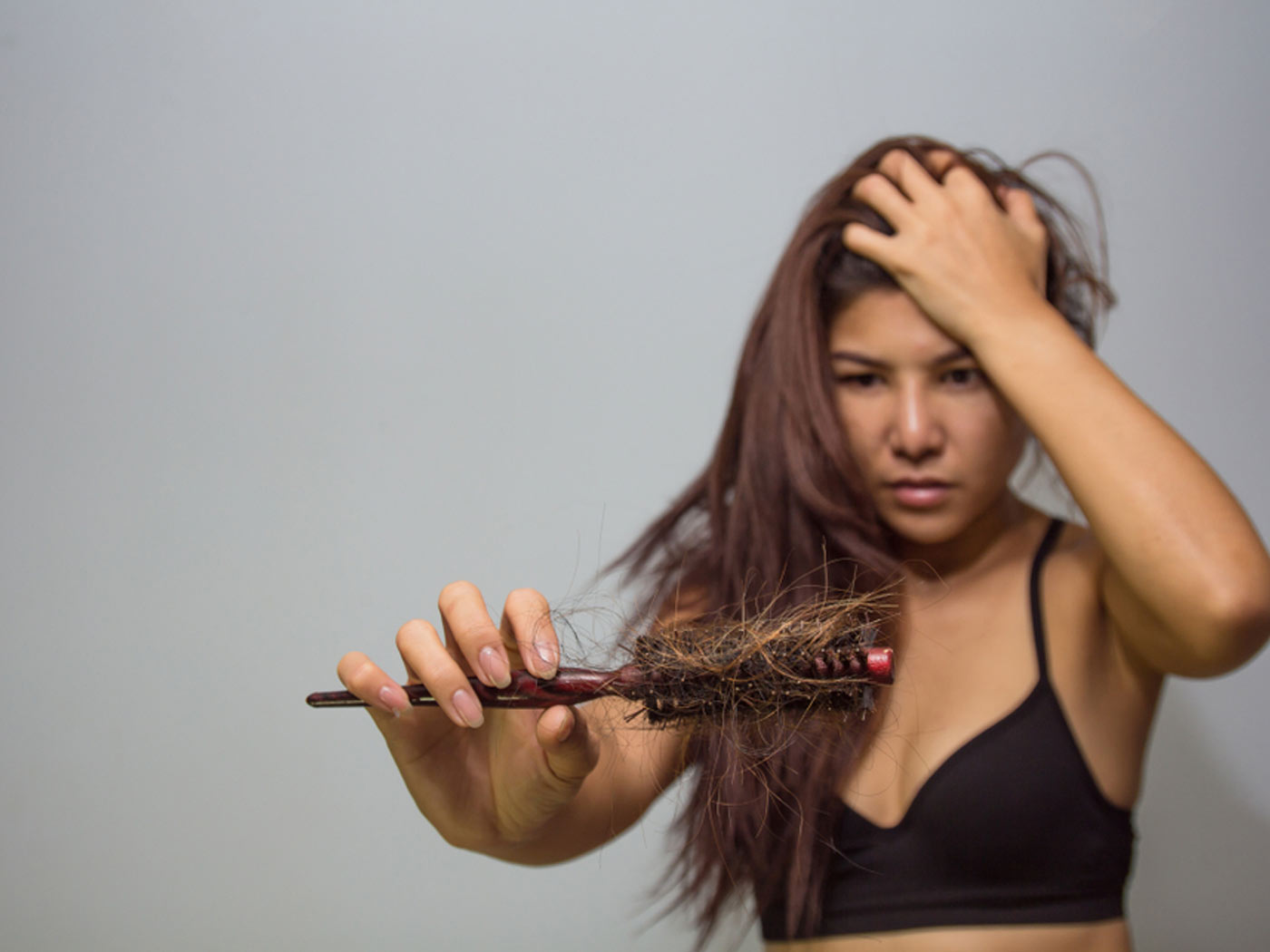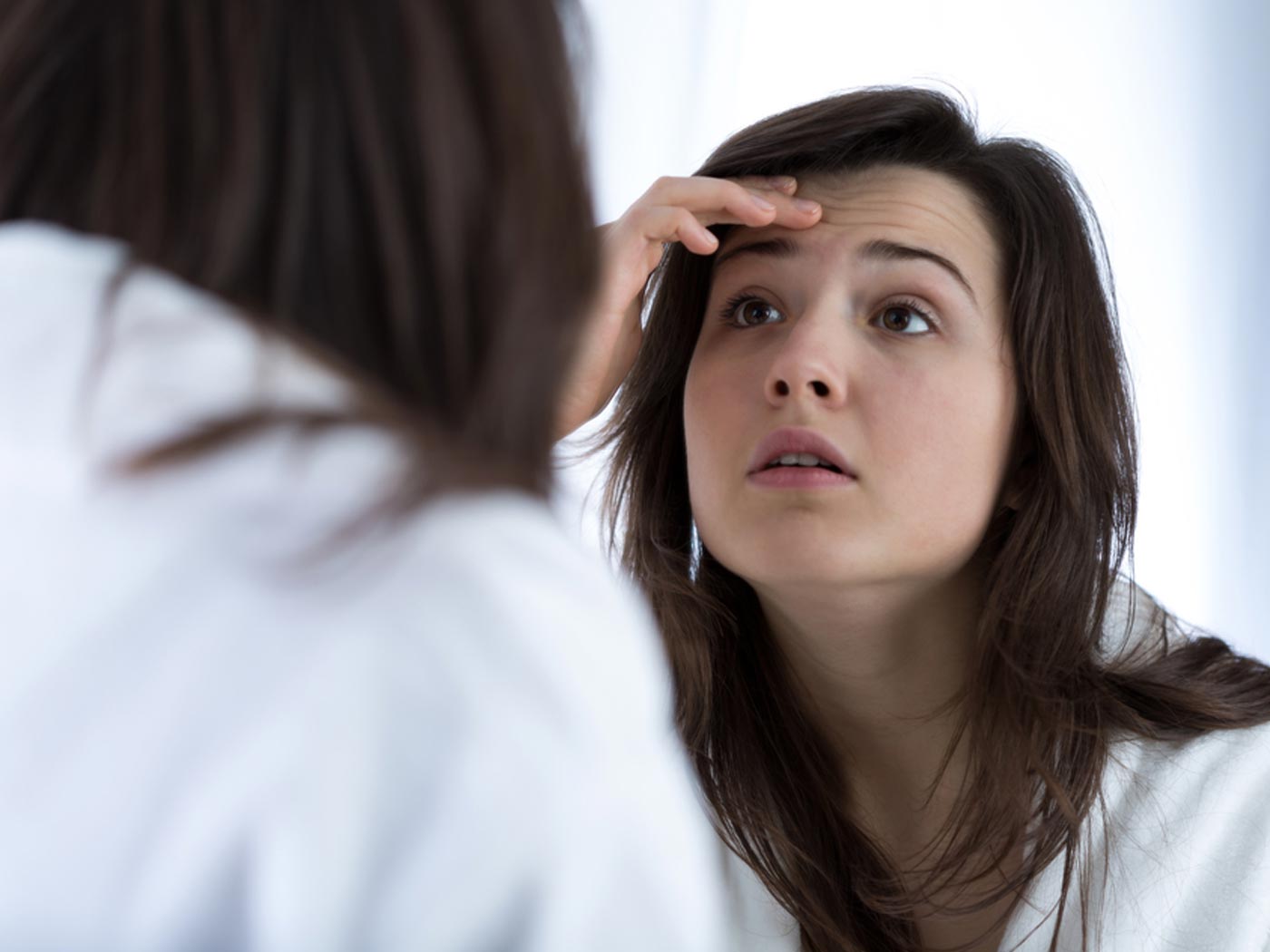
Stress can cause mental, emotional, psychological and physical changes in an individual. Hair loss is one such physical change that can be a result of stress. So, if you've been losing hair drastically while stressing out and questioning yourself, "Does stress cause hair loss?" The answer is yes, it very much does. Now before you worry about it, we're going to tell you a few things about stress-related hair loss that you need to know.
-
Different Types of Hair Loss Caused Due to Stress
-
Can Stress Cause Permanent Hair Loss?
-
Tips to Manage Hair Loss From Stress
-
Conclusion
-
Frequently Asked Questions On Hair Fall Due To Stress
Different Types of Hair Loss Caused Due to Stress:
Hair loss due to stress is very common and these are the three types of hair loss associated with high levels of stress:
-
Alopecia Areata:
There are various factors that cause alopecia areata, and one of them is severe stress. In alopecia areata, your body's immune system attacks the hair follicles that eventually causes hair loss. Stress-related hair loss isn't permanent and hair fall due to stress can be avoided by getting your stress under control. So, if you work on keeping your stress under control, your hair might actually grow back.
-
Trichotillomania:
For some people, hair pulling can be a way to deal with negative or uncomfortable feelings like stress, tension, boredom, frustration or loneliness. And this condition involves getting an irresistible urge to pull out hair from the scalp, eyebrows or other areas of your body.
-
Telogen Effluvium:
Significant stress can push large numbers of hair follicles into a resting phase in telogen effluvium. So, if you're still wondering - Can stress cause hair fall? Yes, it very much can and one of them can be a result of telogen effluvium. Here, you will notice that within a few months, the affected hair might fall off just when you're just combing or washing your hair.
Can Stress Cause Permanent Hair Loss?
Not really! Hair fall due to stress can eventually stop and there is a possibility that new hair might regrow with time. However, the rate of regrowth will be different for each individual. You must know that human hair growth occurs in a cycle of four phases. The average human scalp has about 100,000 hair follicles. And at any given time, each of your hair follicles will be in a different phase of the cycle. Here are the four hair growth phases:
-
Anagen Phase:
This is known as the growing phase of hair that lasts up to two to seven years.
-
Catagen Phase:
This one is a short, two-week phase that occurs when your hair follicles shrink in size.
-
Telogen Phase:
This one is a three-month resting phase, and your hair follicles are at rest during this time.
-
Exogen Phase:
This is the phase when your hair follicles shed the hair and begin to grow new hair strands.
If stress has triggered your hair loss, managing it is extremely important for your hair to return back to full health.
Tips to Manage Hair Loss From Stress:
There are a few things that you can do to manage stress hair loss and encourage healthy hair.
-
Diet and Nutrition:
Very importantly, pay attention to what goes inside your system in terms of foods. Maintaining a balanced, nutritious diet that consists of whole foods is necessary for the overall health of your body, including your hair. Also, try including these vitamins in your diet as they are extremely important for hair growth:
- Vitamin C:
This vitamin helps build collagen, the skin's connective tissue that is found in hair follicles. So, start including citrus fruits, broccoli, bell peppers and strawberries in your daily diet.
- Vitamin B:
B vitamins promote healthy skin and hair along with a healthy metabolism. You can find B vitamins in foods like dark leafy greens, beans, nuts and avocados.
- Vitamin E:
This particular vitamin contains potent antioxidants that contribute to a healthy scalp. Foods like spinach, olive oil, broccoli, shrimp and sunflower seeds are rich in vitamin E.
If your body doesn't get enough of these nutrients, you can talk to a doctor to prescribe you some supplements. Never add a nutritional supplement without consulting a doctor.
-
Stress Management:
You need to learn how to effectively manage stress so that you can reduce the risk of further hair loss. Here are some ways to manage stress:
- Exercise:
Working out daily is one of the best ways to relieve stress. Go for a walk, sign up for a dance class, or perform some light exercises - all of it can keep you active and keep your stress at bay, which ultimately results in better health of your hair.
- Hobbies:
When you keep your mind and body busy doing something that you absolutely love, stress will have no chance to hit you hard. Occupying yourself with one of your hobbies is a great way to combat stress. You can consider volunteer work, planting a garden, starting an art project, painting something, writing a book, etc.
- Meditation and Breathing:
Both of these practices are great ways to allow yourself to focus on the present moment and let go of whatever is bothering you. You can also try to combine meditation with physical exercises like yoga. Any of these can work wonders at managing stress and in turn help you regrow your hair.
-
Topical Treatments:
There are several topical creams, oils and similar products that you can rely on to deal with hair loss. Here are some products that can help:
- Castor Oil:
It is one of the very popular natural ingredients that will help with hair regrowth. You can massage a few drops of castor oil on your scalp every once a week to increase the blood circulation in your scalp and provide your hair follicles with the nutrients that they need to help your hair grow back stronger and healthier.
- Hair Care Products:
You can invest in natural hair care products like the Pure Sense Macadamia Deep Nourish Hair Care Combo. This combo comes with Two Macadamia-infused hair cleansers. The hair cleanser gently cleans and nourishes the scalp and leaves your hair frizz-free.. Macadamia nut oil is the hero ingredient in these products, improves the quality of your hair and stimulates hair growth.
Conclusion:
Does stress cause hair fall? Yes! Can something be done about healthy regrowth? Yes! We've given you ways that can help you regrow your hair back to normal. If over the counter products don't work for you, consult a doctor. They will help diagnose the real reason for your hair loss and advise you on what needs to be done next.
Frequently Asked Questions On Hair Fall Due To Stress:
-
Can stress cause hair loss and will the hair grow back?
Yes, consistent and severe stress can cause hair loss. But there's nothing to worry about as you can use any of the above-mentioned tips to regrow your hair.
-
For how long does hair fall out due to stress?
There is no certain time related to hair fall due to stress. It totally depends on how much stress you take and what you do about managing it. The more you stress, the longer your hair fall will persist. The sooner you manage your stress, the better it'll get for your hair. Fortunately, stress-related hair loss is usually temporary. It can last up to three to six months before your normal hair cycle resumes.
-
What does hair loss due to stress look like?
Patchy hair loss or widening of the parting is how it generally looks like when you're diagnosed with alopecia areata or female pattern hair loss. If you're experiencing telogen effluvium, you will notice your ponytail getting thinner or a sudden increase in hair shedding.






